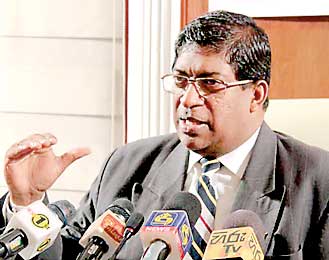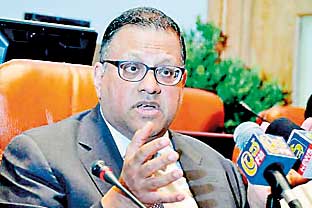Friday Feb 20, 2026
Friday Feb 20, 2026
Wednesday, 3 February 2016 00:19 - - {{hitsCtrl.values.hits}}
Transparency International Sri Lanka (TISL) yesterday said it was perturbed by the recent moves of the Minister of Finance, encouraging inward remittances into Sri Lanka from investors (local, foreign and even ‘mystery’ investors) on a “no questions asked” basis, as a first step in creating a “financial centre” in Sri Lanka.
The Finance Minister invited investors to “park” their deposits, including funds presently in Switzerland and other tax/investment havens, in Sri Lanka as “special deposits” and offered a premium investment return of 2% per annum, with “no locked in investment period”. 
The Minister has subsequently declared that a single “mystery” Belgian national working with a Sri Lankan partner had already remitted $ 500 million under this scheme and the balance of the promised total transfer of $ 1 billion will follow soon.
Officials have separately announced that remittances under this scheme have topped $ 1.5 billion. In announcing the modalities of the deposit scheme, it has been stated that the remitting banks overseas would have already cleared the customer and associated due diligence; and hence there is no requirement for ‘Know Your Customer’ (KYC) and associated validation processes to be repeated in Sri Lanka, though so required under international conventions to be carried out by the recipient banks.
Bank officials, who appear not to have received specific guidelines in connection with this scheme, believe that the scheme is akin to an “amnesty” being declared, exempting the receiving banks from requirements under local statutory provisions and international guidelines.
TISL in a statement said: “This move is contrary to the Prevention of Money Laundering Act requirements. Accepted regulatory frameworks could be exploited to ‘park’ in Sri Lanka ‘black money’ and funds gained through trading in narcotics, dangerous substances and illegal arms, as well as funds associated with serious financial crimes, bribery and corruption and terrorism. It is well recognised that investors of such funds seek new havens to launder their money; and such investors could be attracted by the scheme on offer, which in addition have the attractions of a ‘no questions’ policy, and provides them with attractive investment returns with no lock-in period stipulations.
“These funds can very easily move back/out to other destinations whenever thought fit by the investors, especially after serving the objectives of laundering the money by the using the temporary ‘parking option’. Such actions could result in very serious macroeconomic and financial stability consequences for Sri Lanka in the future.
Sri Lanka is a signatory to international standards on Combating Money Laundering and Financing of Terrorism Proliferation (FATF recommendations), and this move by the Minister of Finance could lead to Sri Lanka being internationally penalised. Such a situation will deter serious and honest foreign investments, which can add significant and sustainable value to Sri Lanka and its people, from coming into the island.
“The FATF recommendations stipulate compliance procedures to be in place to ensure customer due diligence, ranging from record keeping and reporting suspicious transactions to strict regulation and supervision of financial institutions. In terms of the US Foreign Account Tax Compliance Act (FATCA), Sri Lankan banks operating within the framework of this new ‘no questions’ scheme may risk being barred from the US banking system.
“The scheme now introduced without transparency and public discussion, will regrettably create an investment framework operating outside acceptable and desirable best practices, and is likely to leave the country, its business sector and citizens exposed to dangers of penal international sanctions.”
By Charumini de Silva
Sri Lanka’s banking watchdog, the Central Bank confirmed that commercial banks will continue to accept foreign inflows under mandatory international monetary regulations to know the source of funds.
“The normal ‘Know Your Customer’ (KYC) rule applies to any person bringing in money through banking channels,” Central Bank Governor Arjuna Mahendran told the Daily FT.
He went on to say that ‘no’ specific directive has been issued on depositing large scale remittances.
In October last year the Government requested Sri Lankan diaspora to redeposit the cash in the country’s banking system with a promise that ‘no questions will be asked.’
The Daily FT learns that the policy on ‘no questions asked’ was made clear at a recent meeting held with Finance Minister Ravi Karunanayake and the banks.
“There’s nothing called ‘no questions asked’. All significant inward remittances need a declaration of source of funds. The law requires the banks to ask the source of the funding in accepting large scale funds and the banks are bound to follow suit,” said Sri Lanka Banks’ Association Secretary General Upali Silva.
He said banks receiving considerable amounts of funds from local or foreign channels are bound to know their customers and adhere to the money laundering guidelines.
“Although, the Minister initially made a statement on ‘no questions asked,’ after having the discussion he agreed with the banks to ask required questions in accepting funds,” Silva stressed.
In his 2016 Budget speech the Finance Minister urged Sri Lankans who have kept their money outside the country due to various reasons to bring such money to the motherland contributing to the development of the economy.
Further, in line with the liberalisation of the exchange controls, Karunanayake also proposed to abolish
Securities Investment Account (SIA) through which the foreign investors have been requested to channel their investments to the country. Instead, he proposed that investors should be allowed to bring in money to Sri Lanka through any bank account existing in the formal banking system.
“The Government shall not take any criminal action against any persons making inward remittances of such monies held overseas through the banking channel except in instances where the proceeds are the result of terrorism, drugs, human trafficking and corruption,” Minister Karunanayake assured.
The 2016 Budget also proposed to repeal the present archaic and draconian Exchange Controls Act and introduce an investor friendly Foreign Exchange Management Bill (FEMB), which would help attract foreign flows from the SAARC and the world at large.